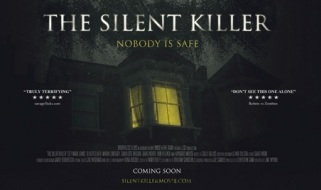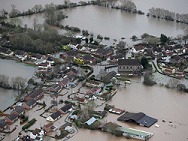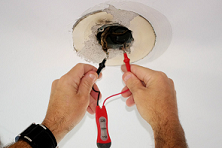After a pretty abysmal first year, it's no surprise that the Green Deal - the UK Government's flagship energy saving programme, is going to be going through some much needed changes. After all, you know its bad when even Energy Secretary Ed Davey - one of the men behind the scheme, calls it "clunky", "complex" and "disappointing".
 Speaking at the Ecobuild convention that's taken place in London's Excel centre over the last few days, Mr Davey launched a consultation on the changes that will be made to Green Deal sister scheme ECO (Energy Companies Obligation), while at the same time reaffirming that the DECC were about to make some vital changes to the overall programme.
Speaking at the Ecobuild convention that's taken place in London's Excel centre over the last few days, Mr Davey launched a consultation on the changes that will be made to Green Deal sister scheme ECO (Energy Companies Obligation), while at the same time reaffirming that the DECC were about to make some vital changes to the overall programme.
He said that the Government had been looking to "streamline" the Green Deal from very early on, and that the fact changes need to be made after only one year shouldn't be that surprising given "the scale of the ambition". He also added that further incentives for people to sign up would be unveiled in the coming weeks.
The latest figures from January did report that the scheme was beginning to make a comeback, with 1,277 plans in place by the end of the month - 746 of which were completed. However Mr Davey stressed that selling finance plans was not the main aim of the scheme:
"The fact that most people currently having a Green Deal assessment are not then going on to choose Green Deal finance plans shouldn’t actually worry us.
"How people pay for energy efficiency improvements is not after all the main issue. The aim of the Green Deal isn’t to sell credit plans, but to make our homes warmer, cheaper and greener."
It's great to see that the DECC are pushing these Green Deal changes, but is there really that much new info since the last time Ed Davey announced what they would be doing. Hopefully this will be a move that brings the Green Deal into the spotlight, rather than empty promises made during a sudden rise that may not amount to anything. Only time will tell...
Via Building.co.uk
With the discovery that students are being actively discouraged from taking up vocational careers such as work in the construction industry, the CITB are urging companies to take more pro-active measures to ensure that the industry looks more attractive to youngsters.
 Their suggestion is for construction firms to start making visits to schools during careers fairs and the like so that they will be in pupils' minds when they are considering what to do once they leave the world of education. Chairman James Wates said that he would like to see 50 employers visit 50 different schools this year, which would "send a powerful message" about the industry and the many opportunities it offers.
Their suggestion is for construction firms to start making visits to schools during careers fairs and the like so that they will be in pupils' minds when they are considering what to do once they leave the world of education. Chairman James Wates said that he would like to see 50 employers visit 50 different schools this year, which would "send a powerful message" about the industry and the many opportunities it offers.
"Our industry has to compete with many others for future talent," he said. "We can’t leave this to existing careers advice because we need to reach teachers in order to reach pupils."
Energy suppliers EDF Energy have already begun taking similar measures, working closely with local schools near its planned new nuclear plant at Hinkley Point. They have said they've already reached out to around 35,000 school students in Somerset, creating a variety of exciting activities through a special education programme. EDF have said the results have been "very encouraging", with many students now considering/re-considering a career in the construction industry.
With less youngsters joining the various construction trades and the industry itself experiencing a boom thanks to housing growth and other factors, more certainly needs to be done before the older workforce retires and the industry suffers even more of a skills shortage. Access Training is doing its part to plug the skills gap, offering intensive training courses in a number of construction trades complete with the qualifications required by employers. Our courses are fast-paced, but offer high-quality teaching that easily rivals the longer courses you find at colleges.
For more information please contact our course advice team on 0800 345 7492.
Via Construction Enquirer
Charlie Mullins, head of arguably Britain's biggest plumbing firm - Plimco Plumbers, has taken a stand to highlight a serious loophole in current gas regulations.
While it is common knowledge that gas engineers need to become Gas Safe registered once qualified in order to legally install and maintain gas appliances, the same does not apply when it comes to the purchasing of boilers and other gas-related equipment. Although some builders' merchants will check their customers registration before letting them buy such things, an increase in internet-based suppliers is making this something harder and harder to police.
Because of this, rogue engineers can find it far easier to trick customers into believing that they are Gas Safe registered. Not only them, but also unqualified indviduals such as homeowners who may not know the rules and believe they could have a go at it themselves. Should a mistake be made by either of these parties, the results can be fatal and potentially cost people their lives.
Therefor Mr Mullins believes that the Health & Safety Executive (HSE) needs to clamp down on this huge flaw in the system, extending its regulation of the gas market to the purchase of equipment - something that can only be done by altering the law.
The Plimco Plumbers CEO considers it "ludicrous" that buying boilers/gas equipment is as simple as walking into a shop or clicking your mouse. He added that gas "in the wrong hands is a lethal weapon and used incorrectly people will end up dead".
 He went on to talk about how once a "cowboy gas fitter or over enthusiastic amatuer" is in possession of these things, the law is powerless to save lives despite it being illegal for them to install it. Certainly prosecutions can follow should that person be found out, but in most of these cases prosecutions only happen after a life-taking tragedy has already happened.
He went on to talk about how once a "cowboy gas fitter or over enthusiastic amatuer" is in possession of these things, the law is powerless to save lives despite it being illegal for them to install it. Certainly prosecutions can follow should that person be found out, but in most of these cases prosecutions only happen after a life-taking tragedy has already happened.
Charlie suggests:"The truth of the matter is there’s only one opportunity to protect people from this dangerous legal anomaly and that’s to make it illegal to buy gas equipment without a Gas Safe ticket. We have built ourselves a pretty decent safety system to protect people from monoxide poisoning, so why do we insist on retaining a great big hole in the net? The law needs to be changed because this is something that will save lives."
What are your thoughts on the matter? Certainly the thought of non-qualified people being able to go into their local branch of B&Q and purchase gas equipment should be alarming to all the Gas Safe registered installers out there, after all the training you have gone through to get where you are today. To become a fully qualified gas engineer, candidates need to go through a rigorous training course - at the end of which they will be able to build up their gas portfolio and pass the required ACS assessments. Only then will you be able to join the Gas Safe register and be legally permitted to work on gas installations and appliances.
To find out more about what it takes to become a Gas Safe engineer and Access Training's range of intensive gas courses, give us a call on 0800 345 7492.
Construction activity may be on the rise, but sadly it seems the industry isn't completely free of problems just yet as the HSE alarmingly cut back on the amount of safety visits they make to sites.
 Wales in particularly has been hit hard as HSE inspectors cut back visits by 35% - incidentally the same proportion by which its budget has been cut. The information was gained by BBC Radio Wales who submitted a Freedom of Information Request to the HSE. Their inquiry revealed that the number of proactive (i.e. unannounced) inspections dropped from 818 in the 2011-12 period to 529 in 2012-13. The number of prosecutions dropped from three to zero in the same timeframe.
Wales in particularly has been hit hard as HSE inspectors cut back visits by 35% - incidentally the same proportion by which its budget has been cut. The information was gained by BBC Radio Wales who submitted a Freedom of Information Request to the HSE. Their inquiry revealed that the number of proactive (i.e. unannounced) inspections dropped from 818 in the 2011-12 period to 529 in 2012-13. The number of prosecutions dropped from three to zero in the same timeframe.
A drop in prosecutions might sound like a good thing and could naturally go hand in hand with less inspections, but alarmingly this has all happened at the same time as a safety blitz in September 2013. During this time, the HSE found that one in three Welsh sites breached safety regulations.
Obviously the news has been of much concern to construction trade unions, with Ucatt regional secretary Nick Blundell warning that the cuts were 'truly alarming'. He added: "Inspections save lives. This fall in inspections is putting construction workers in danger."
He also remarked that with construction finally on the recovery following the long recession, a fall in inspections is naturally going to mean less sites visited. This will be putting new entrants at risk, who are more vulnerable and therefore more at risk of suffering an accident.
This is why it isn't important to know all about health & safety measures on construction sites before starting your new career in the trade. Even the most experienced worker could be at risk, but those fresh out of a construction training course should be wary of what's around them. If you think that your work area is unsafe - don't be afraid to report it.
Via The Construction Index
With the UK becoming more and more aware of dodgy tradespeople thanks to the horror stories reported all over the media (and often on this very blog too!), more has to be done for consumers to be reassured that the people are hiring are honest and fully qualified. The gas industry has the Gas Safe Register, and electricians have any number of competent person schemes - what is there for plumbers?
In previous blog posts last year we introduced WaterSafe - the first plumbing body of its kind. Set up back in October 2013, this national assurance scheme is designed to recognise competent plumbers as well as protect homeowners and plumbing businesses alike. WaterSafe has the backing of all UK water suppliers and water quality regulators, having been developed by all seven existing Approved Contractors' Schemes. Although it hasn't been around long WaterSafe seems to be making a huge impression on the plumbing world, exceeding expectations and targets when it comes to membership figures.
Now WaterSafe have teamed up with BPEC to create a course that ensures plumbers receive all the qualifications required to join the scheme. The specially designed qualification is equivalent to the NVQ Level 2 and Water Regulations certificates - both of which are qualifications we offer here at Access Training Academies. So while the specialised course itself is still rolling out across the country (to date only three training centres in the UK have been given the go-ahead to run it), aspiring plumbers elsewhere should know that we can still offer them the means to eventually become part of this great (and FREE) scheme.
To find out more about our intensive plumbing courses and the qualifications you'll need to be viewed as an experienced, competent and QUALIFIED plumber, give our course advice team a call on 0800 345 7492. Stamping out rouge tradespeople is something we all need to be a part of, and the first step toward doing that is properly setting them apart from the honest ones in the country such as yourself.
The Gas Safe Register isn't just a comprehensive register of the UK's qualified gas engineers (something that is a legal requirement - not just something we recommend to our gas course trainees!), it also plays a huge part in promoting awareness gas safety and making sure people know how to detect a gas leak. And their latest efforts have paid off, as the Register is awarded a DBA Design Effectiveness Award for its 'Silent Killer' campaign.
 The campaign was set in motion after one in five homes in the North West were found to have unsafe gas work, and used a mix of online, local press, outdoor advertising, events, and even a horror-movie styled advertisement. All of these steered viewers towards the 'Silent Killer' campaign website, where they could then book a gas safety check and sign up for an annual reminder. The campaign was a roaring success, with the Gas Safe Register seeing a 300% increase (equivalent tomore than 53,000 homes) in higher risk households signing up for annual checks.
The campaign was set in motion after one in five homes in the North West were found to have unsafe gas work, and used a mix of online, local press, outdoor advertising, events, and even a horror-movie styled advertisement. All of these steered viewers towards the 'Silent Killer' campaign website, where they could then book a gas safety check and sign up for an annual reminder. The campaign was a roaring success, with the Gas Safe Register seeing a 300% increase (equivalent tomore than 53,000 homes) in higher risk households signing up for annual checks.
The Design Effectiveness Awards 2014 gave 'Silent Killer' the gold award in the 'Design for Society' category, featuring the full case study on its effectiveness outlined by Gas Safe on their website. Gas Safe Register marketing and communications director Nick Terry commented that: "“The Silent Killer pilot was the first time Gas Safe Register had aimed to persuade people to change their behaviour, rather than simply raise awareness of the dangers of gas work. It was therefore vital that the design was engaging and would encourage people to act; by getting their gas appliances checked by a Gas Safe registered engineer."
He continued to say that the campaign's success has helped shape future ones to come as more and more people sign up to protect themselves from unsafe gas work nationwide. However in a perfect world they shouldn't need protection - all gas installers would be professional and above board, fully qualified members of the Gas Safe Register. Unfortunately there are those out there who aren't so honest, and while they are always eventually caught they put lives at risk with dangerous workmanship. At Access Training Acadmies we make sure all candidates on our intensive gas training courses are given expert levels of tutelage, teaching them the very basics of gas engineering all the way up to assisting them with their gas portfolios and ACS assessments. For more information, call 0800 345 7492 to speak to one of our advisers.
But for now, congratulations to the Gas Safe Register and long may its good work continue!
It isn't the most ideal circumstances for tradespeople to have benefitted from, but with UK still being battered by wind, rain and flooding an increasing amount of homeowners are turning to tradespeople to help repair and/or waterproof their homes. And Goverment-endorsed standards group Trustmark report they've seen a 300% increase in flood protection services in comparison to this time last year).
 Their records showed that the number of searches for flood recovery specialists represented more than 3% of all searches in January and, in total made up 11% of all searches for TrustMark tradesmen in the same month. Damp proofing and timber treatment specialists were the fifth most sought after master trade (out of 21) on the site, with figures also doubling since December (tripling since July!) for homeowners searching roof repairment to fix broken tiles and leaking roofs. Other highly sought-after tradespeople included tree surgeons (150% rise in the last month), fence installers (120%) and handymen (140%).
Their records showed that the number of searches for flood recovery specialists represented more than 3% of all searches in January and, in total made up 11% of all searches for TrustMark tradesmen in the same month. Damp proofing and timber treatment specialists were the fifth most sought after master trade (out of 21) on the site, with figures also doubling since December (tripling since July!) for homeowners searching roof repairment to fix broken tiles and leaking roofs. Other highly sought-after tradespeople included tree surgeons (150% rise in the last month), fence installers (120%) and handymen (140%).
TrustMark's PR head Stuart Carter commented that it was 'clear that homeowners are really seeing the importance of preparing for the worst as seasonal extreme weather becomes the norm in the UK'. A sad truth really, which is why tradespeople should gear themselves up to be able to help homeowners in these months where they may need them the most. Access Training Academies offer intensive carpentry courses which will undoubtedly come in handy when dealing with any wood repair work a tradesperson may come across during flood season. The same goes for bricklaying courses, which we also provide from our training centre just outside Cardiff city centre.
For more information give our course advice team a call on 0800 345 7492.
Via HVP Mag
Back in January official Government figures showed that the Green Deal wasn't doing too well - in fact in it's first year it had barely managed to achieve a fraction of its expected targets. And although the Government admitted things weren't working out quite the way they had anticipated, Climate Change minister Greg Barker still considered it an encouraging start and was confident things were going to pick up in 2014. Could he have been right?
Electrical body NICEIC are reporting that now more than 1000 companies have signed up for Green Deal installer status with them, alongside further news that consumer interest has picked up in recent months. Since the end of December, an impressive 129,842 Green Deal assessments are said to have been lodged. With only 1,612 houses recorded to have made plans overall (with a further 626 houses having plans in place), this figure alone has the potential to upset last years numbers.
 NICEIC head of operations Paul Collins said, "The government is committed to ensuring that all work undertaken via Green Deal is carried out by registered firms and with interest in the initiative now ramping up we are seeing more and more firms look to get involved. We have witnessed a large number of skilled professionals such as electricians, plumbers, heating and gas engineers come to NICEIC for certification as it is a name associated with quality and assurance."
NICEIC head of operations Paul Collins said, "The government is committed to ensuring that all work undertaken via Green Deal is carried out by registered firms and with interest in the initiative now ramping up we are seeing more and more firms look to get involved. We have witnessed a large number of skilled professionals such as electricians, plumbers, heating and gas engineers come to NICEIC for certification as it is a name associated with quality and assurance."
So maybe the Government's confidence in the Green Deal wasn't unfounded? That being said it still has a long way to go yet - after all if none of these put plans in place then the Green Deal is back at square one. For those still not in the know about this Government programme, the Green Deal aims to fund energy-saving upgrades to homes without any upfront costs for installation. Instead, the costs are added to your energy bills and staggered over time.
This may sound offputting, but the rule of the Green Deal is that the repayments MUST be less than the money you're saving on your energy bills - so you'll be paying less regardless of the installments. Interested customers must first have a propety assesment performed by a special Green Deal advisor, who will look at your home's current energy performance and suggest what measures are suitable for you. From there you can begin searching for quotes from Green Deal providers who will be able to tell you the overall cost of the work.
More information on the Green Deal can be found on the DECC (Department of Energy and Climate Change)'s website, but expect more news in the future as it seems there's life in the programme yet!
While an electrician who's undergone a proper electrical training course and earned their qualifications would never make these kind of mistakes, unfortunately the industry is rife with unqualified individuals looking to make an easy bit of cash without any regard for their customer's safety (or even life). These cowboy builders commonly do poor electrical installation jobs, resulting in customers having to call out proper professionals to fix things.
New research from Trade Skills 4 U has found the most common jobs electricians are called out to do after a cowboy builder or naive DIY enthusiast has done a poor job of it. Many of these shouldn't be taken lightly, as they can easily cause electric shocks that could result in death. Potentially fatal mistakes including drilling through wiring, repairing electrical appliances while they are still switched on and even cutting through power leads.
With the most common jobs involving either light fittings (41%) and lighting circuits (29%), its no surprise that many naively believe they have the skills to complete such tasks without having done an electrical course. In fact, one fifth of the people sampled said that they will confidently attempt to install new lighting in their homes without any electrical training. One tenth said they'd do the same installing new wiring.
These might be simple jobs for an electrician to carry out, but for someone without the proper training they can be very dangerous. At the very minimum anyone attempting these sort of jobs should have the 17th Edition Wiring Regulations and Part P qualifications, both of which we offer courses for here at Access Training Academies. Shoddy electrical work could cost someone their life and it might not be yours - it could be your friends' or family members'. Ask yourself, is it really worth it?
To find out more about the electrician courses we offer at Access Training, give our advice team a call on 0800 345 7492.
Via DIY Week